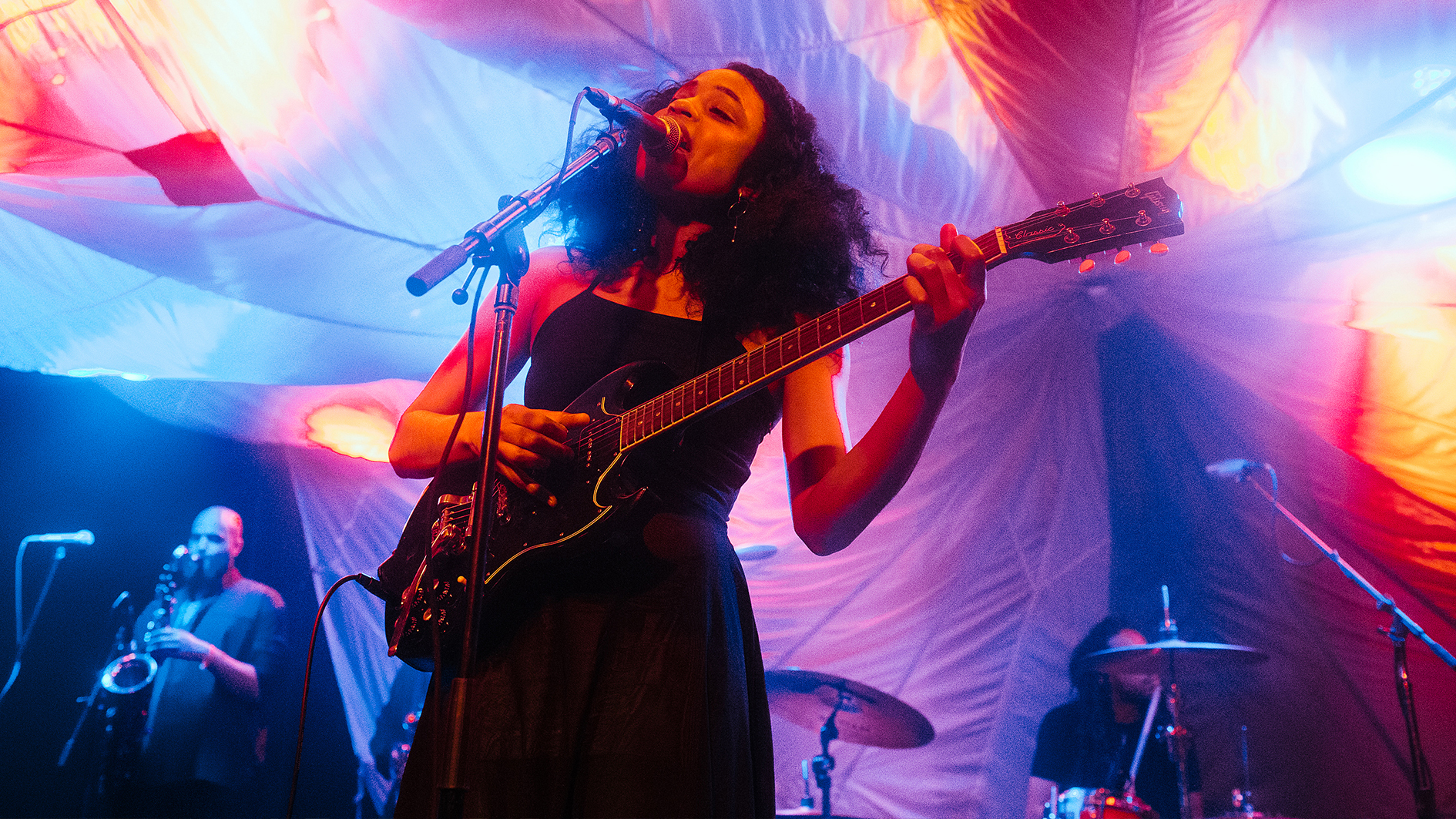Adia Victoria: “The guitar is an outlet for me, a safe space to express a range of emotions that women – especially black women – aren't able to openly exhibit”
The gothic blues singer-songwriter on finding a friend in the guitar, the “unfettered connection” of an acoustic, and the lasting influence of Skip James on her new album, A Southern Gothic

Adia Victoria got her first guitar at 21 years old and, ever since, has had a fruitful love affair with the six-string. Truly, hers is a deep connection with the instrument. When she got her first acoustic guitar, the soon-to-be prolific songwriter had always lacked what the guitar gave her: something of her own to wield in the world.
Victoria, who grew up in a repressive religious environment in South Carolina, found in the guitar a way out. It was an object she could use to be both student and teacher, artist and narrative writer. It became her best friend to which she revealed her darkest secrets. It also became the window through which she saw the world in new and darkly historical ways.
All of this passion and education is laid out on Victoria’s new 11-track LP, A Southern Gothic. For the 35-year-old artist, the guitar is a tool she can use to reveal stories long hidden about the black American experience, her own childhood and stories about subjects like the magnolia and its sordid symbolism.
We caught up with Victoria to ask her about forging her bond with the guitar, how it influenced her musical sensibility and how it shaped her new LP.
You got your first guitar when you were 21 years old. Can you describe that moment and what holding the instrument inspired in you?
“My best friend decided to go and try and be Mormon. She left in the beginning of the summer of 2011. She flew out to Washington State, and failed at being a Mormon, thank god. But she left me a Washburn guitar. I was like, ‘Uh…’ She was like, ‘Can you watch my stuff? I just need to store my shit.’ So, she left me the guitar and I was like, ‘Okay.’
“But I would just sit in my room and play with it and hold it. It was in my bed with me. I was so intrigued by the sounds it was making. I had no musical theory concept of how the guitar worked or how it should sound. Or the proper technique of how to do things. I was just like – I knew that I needed a friend. I knew that I needed a way to speak, even though I was so alone. And the guitar just became this best friend for me.
Get The Pick Newsletter
All the latest guitar news, interviews, lessons, reviews, deals and more, direct to your inbox!
“I remember the way my first blisters formed on my hands. The pain of trying to learn the barre chords and becoming so frustrated and crying and cursing the guitar.
“But what I realized at the time was that the guitar was becoming an outlet; it was a safe space for me to express this whole range of emotions that women are so often told – especially black women – that they’re not openly able to exhibit like pride, arrogance, frustration, rage, delight, pleasure.
I hate when people try and tell me how to play a song. Just let me listen to the song and touch my guitar and I’ll figure out how to make some sounds the way I want it to sound
“I felt all this while I was learning the guitar. I felt my relationship with my hands change. I became more aware of my fingers. I would do finger isolation exercises while I was at my desk at work [as a telemarketer in Atlanta, selling cable and internet].
“I didn’t realize how smart my hands could be. I realized, trying to train my pinky while I was playing – I was like, man, my pinky. I can do things actually with my pinky! Because you don’t think about that.
“But my relationship with my body changed. I realized that my body didn’t just exist for people’s consumption. It didn’t exist as a vehicle for men’s pleasure and judgment. It actually existed for me to do something with for myself. Yeah, so, that was my experience with getting to know that shitty little Washburn acoustic.”
And how did you get better? Were there techniques you labored over – did you play often?
“Honestly, I tried to look at a lot of the videos online to learn specific songs but I didn’t like the idea of sitting around with some dude on YouTube in a Fedora hat telling me how to play the blues. And one of the best ways I found was this app called Songsterr. I was able to learn how to read tabs and do stuff on my own. I was able to isolate sections of songs, repeat them, slow them down.
“It was very hands on for me and that’s the way that I learn. I don’t learn by people telling me things; I learn by putting my hands on things. I really loved the ability with Songsterr to be my own teacher, be my own student and not have anybody else involved in the process.
“I hate when people try and tell me how to play a song. Just let me listen to the song and touch my guitar and I’ll figure out how to make some sounds the way I want it to sound.”

You mentioned before how holding the guitar made you feel when you first got it. But how does you feel now when you pick one up?
“I feel alive.”
There’s a lot of acoustic guitar on the new record. What was your intention there, as a songwriter, over, say, using more electric?
“Well, I live with my mom and my sister, so I can’t make too much noise all the time. And I just like being able to hear the direct sounds that my fingers are making. Sometimes with an electric guitar run through pedals and stuff, you really don’t know if it’s you or the machine. Or who is making what?
“But I know if I can change the way that I’m holding, the way my fingers are meeting the frets or the strings, there’s an immediate response with the sound that the guitar is producing.
“So, I like that unfettered connection between my hands and the sound. Yeah, I just wanted to feel more un-fucked-around-with while I was making these songs. Like, I was just in my room writing songs – nothing fancy is going on here!”
If you want to talk about gear, you should talk to my lead guitarist, Mason Hickman. We joke that I’m the Thom Yorke to his Jonny Greenwood
Are there particular guitarists or guitar performances that you’ve studied or felt yourself drawn to over the years?
“Skip James’ work. He’s my primary guidance counselor when it comes to music. I pretty much live in open D minor. And not to compare my level of proficiency to his, because it doesn’t even touch it, but I just love the way his fingers dance. You learn a Skip James song, and once you break that feel into his musicality, you’re like, ‘Holy shit, how did this man’s mind work?’
“Learning his music, I immediately was like, ‘I need to know about this man’s life’, because he was trying to tell me something with the way that he was orchestrating songs, his riffs, his rhythms. Yeah, Skip James is definitely my dude.”
Do you have favorite guitars or gear that you use either to play live or to record with these days?
“No, I just got this shitty little Fender Paramount Series that I like. It’s modeled after the kinds of guitars that the cats like Robert Johnson played, [with a] smaller body. I love that. And I’ve got my Gibson SG that I had a Bigsby put on. That’s pretty sweet.
“But no, I’m not too much of a gearhead. If you want to have that conversation, you should talk to my lead guitarist, Mason Hickman. We joke that I’m the Thom Yorke to his Jonny Greenwood.”
How did you approach the guitar parts as you wrote songs like Whole World Knows or Troubled Mind?
“I don’t know. I just search for the sound on the guitar and I just meditate with it. It’s almost like a really private question, an intimate question. I can’t really put it into words. I just sit with it.”
What do you love most about the guitar?
“It allows me to create worlds where I can go and get away from this fucked-up world.”
- Adia Victoria's new album A Southern Gothic is out now via Atlantic Records.
“The rest of the world didn't know that the world's greatest guitarist was playing a weekend gig at this place in Chelmsford”: The Aristocrats' Bryan Beller recalls the moment he met Guthrie Govan and formed a new kind of supergroup
Carlos Santana hospitalized following pre-show medical emergency


![[from left] George Harrison with his Gretsch Country Gentleman, Norman Harris of Norman's Rare Guitars holds a gold-top Les Paul, John Fogerty with his legendary 1969 Rickenbacker](https://cdn.mos.cms.futurecdn.net/TuH3nuhn9etqjdn5sy4ntW.jpg)







